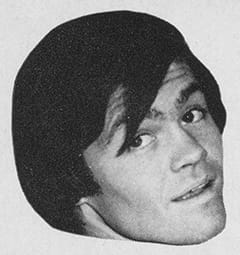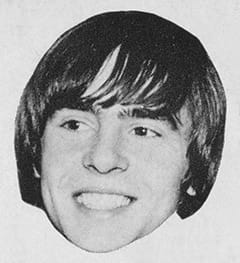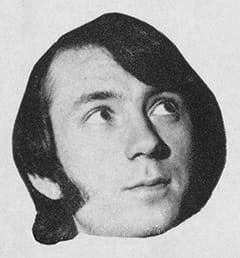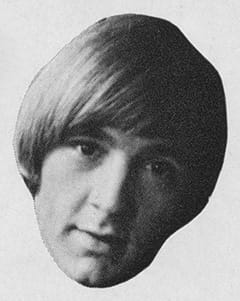We were explaining how Mike Nesmith, as a young and married man still in search of stardom, felt he was in danger of becoming one of nature’s drifters. He’d wandered round Hollywood clubs, like the Troubadour and Ledbetter’s, grabbing what work he could—but he simply hated any idea of a disciplined life.
First reaction Permalink
And, he says now: “When I saw the advert in Variety about the Monkees’ audition, my initial reaction was that it wasn’t worth my while going after it. For a start, I didn’t have all that much confidence in myself. And another thing is that I didn’t dig all that show-business jazz.
“You see, I enjoyed singing and I enjoyed entertaining other people. But I’d met up with some of the real show-biz figures and they didn’t do much for me. All the time they gave out with this phoney talk that gave me a creepy feeling down the back of my spine. They were kidding each other, not to mention themselves, by saying things that were nice to say but which just didn’t have anything to do with truth.
“Now the way I had things going was that I could do a show then go home to Phyllis, or just sit around and talk with friends who would always be completely honest with me. And me to them. We talked about things that concerned us, like the problems of Negro people in the States, and we didn’t waste time on things like clothes and jewellery and that kinda stuff.
“So sure I read about the Monkees’ auditions but I thought: ugh, that’ll be the WORST kind of show business. And I figured it wasn’t for me.”
But some university friends persuaded him that he owed it to himself and to his wife to go along and at least SEE what was happening. Mike hummed and hahhed and finally agreed. He crammed on his green wool hat, tugged on his cowboy boots and sauntered over to the studios where the auditions took place.
“I’ll be honest with you—I didn’t care much what happened. I was stupid. I’d set my mind against something even before I knew what it was all about. This was crazy coming from me… a guy who believed that everyone and everything should be given a break, to see whether the balance of opinion was worthy or unworthy.
“That audition was pure crazy, too. It looked like every boy between the ages of 17 and 21 had turned up to try to get in on the act. They’d specified that they wanted mad-cap characters and some of ’em went a bit over the top in trying to give the impression of being so way-out thay [sic] were pretty well out of this whole world.’
He went in. I heard a groan from one of the auditioners… “oh, no, not another guy wearing those terrible boots”. Mike shot a pretty tough glance in the direction of the voice—after all, he figured, television producers probably got a lot of money, but near unemployed singers had to economise on such material things as getting the latest in-style boots.
Then they fired a question at him. “What do you think YOU’RE doing here, fella?” And suddenly it sank into Mike’s ever-alert mind. He says now: “They were deliberately putting me on… just to see if I could improvise my way out of it. They were pretty ruthless, I’ll say that for them. After I mumbled some pretty sarcastic reply about being there ’cos of some crazy and badly-written advertisement, they just left me alone completely for a while. I was supposed to stand there and shuffle my feet around or twiddle my thumbs or somethin’.
“It was a test and it was up to me to do something about it. So I fooled around with some things they had on the desk and I started asking questions of them. This fooled them and a couple of them actually started in answering me. Then they realised I had switched the roles round. I saw them start to relax, then join in the spirit of the thing. And I also realised that these weren’t bad guys. Not at all like the show-biz folk I didn’t go for.”
Mike’s audition went on for quite a while. Even so, he didn’t think he’d be even considered for a part in the Monkees’ series. And when he was finally requested to ring back to the studios, for further discussions, he couldn’t believe his luck. As he says: “Being married and all, I guess I’d got to FEELING older than other guys of my age, so I felt I was ruling myself out of being a Monkee. But I’m sure glad I allowed those friends of mine to talk me into going to the audition.”
And so are we. And furthermore this is a good point to leave Mike for a while and return to Peter Tork, whose mate Steve Stills had also pointed out the advertisement in “Variety”. For different reasons to Mike, Peter also was a bit diffident about bothering to turn up for the audition.
He says: “Though I hadn’t been earning much money, I’d been enjoying my life with friends like Steve and John Hopkins and so on and I’d built up a circle of buddies who, in some strange way, had come to depend on me. Don’t ask me why this should be. I was no better at finding work than they were, but I’d become a sort of unofficial leader of our gang. Now I really wanted to get into show business, make a name for myself, but I didn’t want these guys to think I was planning to duck out on them.
“In the end, though, I caught a bus into Hollywood and joined a queue of boys who were hoping to become Monkees. Up to that point, I’d reckoned myself to be a pretty confident kind of fellow. I didn’t let things worry me much, but I also knew that I was rather shy with people I didn’t know. I got to talking to some of the other kids, but I knew the big pressure would be on when I got in there with the producers involved.
Public eye Permalink
“Afterwards, long after the Monkees were started and in the public eye, the four of us compared notes about HOW we’d actually joined the group. Seems the others found their tongues early on in the audition, but me I felt like my tongue was somehow sliding backwards down my throat. If that audition had been carried out purely on what we SAID, then I’d still be back there washing dishes and singing folk songs in between times.
“They did these crazy things. Like a couple of the guys on the adjudicating panel started chucking golf balls from one to the other. They didn’t say anything at all for an eternity…
“All I could do was register what a crazy set-up this seemed by letting my face go. That’s how I got in, I swear it. I was so genuinely amazed at what was going on—it was so unlike anything I’d ever experienced—that my face showed about a million different expressions all at once. Now a facial expression isn’t much to go on, when it comes to finding talent… after all, it’s there one second and gone the next. But these guys were clever and shrewd. And they were filming us as we went through the auditions. I’ve seen these films since and I must admit I looked pretty insecure and bemused.”





